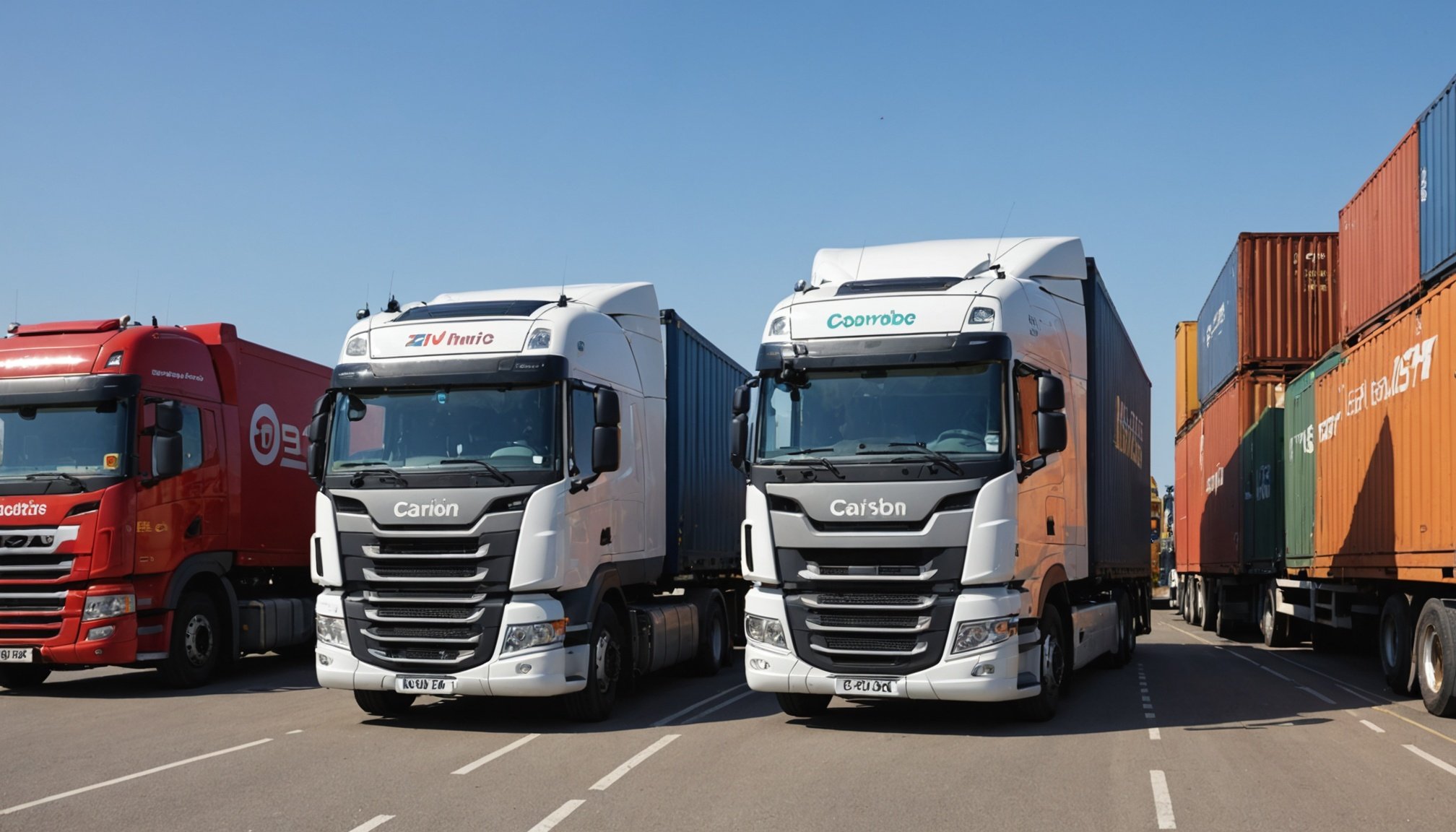Overview of Carbon Emissions in UK Logistics
The UK logistics sector significantly contributes to carbon emissions, forming a considerable part of the country’s overall environmental impact. Currently, this industry is responsible for a sizeable portion of the nation’s carbon footprint. This positions it as a critical focus area for sustainability efforts. The key contributing factors to emissions within logistics include fuel consumption in transportation, inefficiencies in delivery routes, and energy use across logistics facilities.
Addressing carbon emissions is imperative for the sustainability of the logistics sector. Reducing these emissions not only assists in combating climate change but also aligns with the growing environmental consciousness among consumers and businesses. Making the logistics industry more environmentally friendly can lead to enhancements in efficiency, cost reductions, and compliance with regulatory demands.
Also read : Comprehensive handbook to navigating uk legal regulations for starting your cryptocurrency exchange
Transitioning toward greener practices in logistics can involve adopting technologies and methodologies aimed at lowering emissions. This includes the introduction of energy-efficient vehicles, optimising supply chain operations to reduce waste, and utilising renewable energy sources. By doing so, the UK’s logistics sector can achieve a significant drop in its carbon emissions, ultimately contributing to a healthier planet and a more sustainable economy.
Innovative Technologies for Emission Reduction
In the quest for greener logistics, numerous innovative technologies have emerged, promoting emission reduction across the industry. For example, telematics systems allow companies to gather data on vehicle performance, leading to improved fuel efficiency and reduced emissions. Electric vans and trucks are being increasingly adopted, especially in urban areas, to decrease dependency on fossil fuels.
Additional reading : Unleashing opportunities: the growth potential of uk tech companies in africa”s telemedicine sector
Case studies highlight how certain UK logistics companies have seamlessly integrated these technologies to achieve notable results. Company A, for example, transitioned to an electric fleet, which led to a significant lowering of their carbon footprint, as well as cost savings on fuel. This move towards green logistics not only demonstrates environmental responsibility but also boosts the company’s public image.
Looking to the future, sustainability in logistics is set to advance even further with trends like autonomous vehicles and the Internet of Things (IoT) driving innovative solutions. These future trends are likely to make logistics operations even more efficient, greatly contributing to reduced emissions. Such advancements highlight a promising path for businesses to embrace, aligning with both ecological goals and regulatory requirements while maintaining their competitive edge.
Case Studies of Successful Logistics Companies
Examining successful companies can offer valuable insights for others aiming to reduce their carbon footprint in logistics. Let’s delve into how some companies have effectively implemented best practices.
Company A: Implementing Electric Vehicles
Company A exemplifies the transition to a more sustainable fleet by adopting electric vehicles (EVs). This significant shift has led to notable emissions reductions and considerable cost savings on fuel. By replacing traditional vehicles with EVs, they have not only decreased their dependence on fossil fuels but also enhanced their operational efficiency. Their plans for further sustainability initiatives continue to bolster their eco-friendly image and market presence.
Company B: Optimizing Delivery Routes
Focusing on route optimization, Company B has successfully minimized its environmental impact. By employing advanced software and strategic planning, they have significantly reduced fuel consumption and emissions. Additionally, these efforts have resulted in substantial economic benefits. Despite facing initial challenges, such as software integration, they have developed tailored solutions to overcome these hurdles.
Company C: Adopting Renewable Energy Sources
By integrating renewable energy within their logistics operations, Company C has achieved exceptional emission reductions and operational efficiency improvements. Transitioning to solar and wind energy sources has been pivotal. They are also taking committed steps towards becoming fully sustainable, marking a progressive pathway for others in the industry to follow.
Economic Benefits of Sustainable Logistics Solutions
Adopting sustainable logistics practices can result in substantial economic benefits. Initiatives such as upgrading to energy-efficient vehicles or optimizing delivery routes have been shown to lead to significant cost savings. For instance, replacing traditional fuel-powered fleets with electric vehicles drastically cuts fuel expenses. Additionally, streamlining delivery routes through technology not only reduces emissions but also minimizes fuel consumption, thereby further decreasing operational costs.
Moreover, sustainability is increasingly synonymous with competitiveness. Companies demonstrating environmental responsibility are often preferred by eco-conscious clients, providing firms with a larger market share and improved brand image. This shift towards sustainability helps companies align with evolving market demands, potentially increasing customer loyalty and sales growth.
Future economic trends underscore a growing support for green logistics. As environmental regulations tighten, logistics businesses that invest now in sustainable solutions will likely benefit from future cost advantages. Furthermore, government incentives for environmentally friendly operations can offer financial support, ultimately leading to a healthier bottom line. Thus, prioritizing sustainable logistics not only helps the environment but also bolsters economic growth and corporate prosperity in a changing regulatory landscape.
Sustainable Practices and Methodologies
The logistics industry is embracing sustainable practices to effectively reduce its carbon footprint. Implementing eco-friendly solutions involves strategic methodologies that not only support environmental benefits but also enhance operational efficiency. One prevalent sustainable approach is the concept of lean logistics, which focuses on reducing waste and optimizing every facet of the supply chain. By streamlining processes, logistics companies can minimize energy use, lower emissions, and reduce costs, contributing to overall sustainability.
Moreover, the integration of the circular economy principles into logistics operations signals a shift towards a more sustainable future. This approach encourages the reuse, repair, and recycling of products, limiting waste and conserving resources. Companies applying circular economy models enjoy benefits such as prolonged product life cycles and cost savings from reduced material consumption.
Prominent techniques in logistics involve ensuring efficient route planning and utilizing technology for precise inventory management. This not only decreases unnecessary mileage and fuel consumption but also improves delivery speeds and client satisfaction. For logistics companies eager to become more sustainable, adopting these methodologies can lead to substantial improvements in their environmental impact, offering both ecological and economic rewards. These practices pave the way for fostering resilience and carving a path towards a greener logistics landscape.
Regulatory Frameworks Supporting Emission Reduction
In UK logistics, regulatory frameworks are pivotal in steering industry practices towards sustainability. The government has established rigorous policies aimed at slashing carbon emissions to comply with national and global environmental commitments. Key measures include the Clean Air Strategy, targeting sectors contributing to air pollution, and the Road to Zero strategy, promoting the shift to zero-emission vehicles. These policies not only guide companies but also encourage investment in cleaner technologies.
International regulations further influence UK logistics. The Paris Agreement’s global framework necessitates emission reductions, incentivizing companies to adopt sustainable practices. Compliance with such international standards facilitates access to new markets and partnerships, aligning logistics operations with global sustainability goals.
For logistics businesses, aligning with these regulatory frameworks can unlock funding and support opportunities. Government incentives often accompany compliance with emission targets, offering financial rebates and grants for adopting green technologies. Companies prepared to navigate and adapt to these regulatory landscapes can realise long-term economic and operational advantages, promoting a more sustainable logistics industry. Emphasizing collaboration with regulatory bodies can enhance this alignment, allowing for smoother transitions and increased support for innovative sustainable solutions.
Practical Tips for Implementing Sustainable Solutions
Efficiently implementing sustainable logistics solutions requires a strategic approach. Here’s a step-by-step guide to help logistics companies transition toward sustainability.
-
Assess Current Operations: Begin by evaluating your existing logistics practices to identify areas of high carbon emissions. At this stage, gathering data is crucial for setting clear sustainability goals.
-
Set Clear Objectives: Define specific targets for emission reductions. Objectives should be SMART (Specific, Measurable, Achievable, Relevant, Time-bound) to facilitate progress tracking.
-
Utilize Key Performance Indicators (KPIs): Implement KPIs tailored to your sustainability goals. Examples include measuring reductions in carbon emissions per delivery and percentage increase in energy efficiency.
Collaborative efforts also play a pivotal role in sustainability outcomes. Partnering with environmentally responsible suppliers ensures consistency in eco-friendly practices across the supply chain.
-
Pilot Sustainable Initiatives: Start with smaller pilot projects such as switching a portion of your fleet to electric vehicles or testing new route optimization software. Analyze results and scale successful initiatives.
-
Engage Stakeholders: Ensure internal alignment by fostering a sustainability-focused company culture. Additionally, communicate your green commitments to customers, strengthening your brand image and market appeal.
Case Studies of Successful Logistics Companies
Exploring case studies offers a window into how logistics companies successfully integrate sustainable practices.
Company A: Implementing Electric Vehicles
Company A’s transition to an electric fleet marks a substantial step towards sustainability. They replaced traditional vehicles with electric ones, achieving remarkable emissions reductions and cutting fuel costs. The initiative not only lowered their environmental impact but also improved operational efficiency, showcasing a model for eco-conscious initiatives. Their future sustainability plans aim to further solidify their market presence through continued eco-friendly measures.
Company B: Optimizing Delivery Routes
With a focus on route optimization, Company B strategically minimized its ecological footprint. By integrating advanced software, they effectively reduced fuel consumption and emissions, leading to significant economic benefits. Despite initial challenges, like software integration, tailored solutions paved the way for streamlined operations and enhanced sustainable practices.
Company C: Adopting Renewable Energy Sources
Company C’s integration of renewable energy in logistics operations brought about substantial environmental and efficiency gains. Their shift to solar and wind energy proved pivotal in achieving emission reductions. The committed steps toward full sustainability signal a forward-thinking path for the industry, providing a roadmap for others eager to embrace greener solutions.











